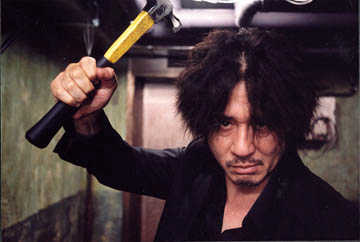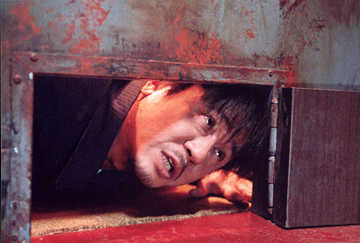

A man finds himself imprisoned for no reason in a room for fifteen years. Upon release, his captor gives him a cell phone, a wad of money, and a new set of clothes and challenges the prisoner to find him and discover the reasons for his imprisonment. This is the premise for the 2004 Cannes Grand Prize Jury Winner, and favorite of Quentin Tarantino, Oldboy. After watching, it's clear why Tarantino liked this film, which is a combination of Kill Bill, The Count of Monte Cristo, and a little bit of Saw thrown in for good measure. Aside from the gratuitous violence, there are actually some deep philosophical questions to ponder, but overall, it's hard to see why this film was deemed the best film at Cannes (well, Tarantino was the head of the jury…).
When the audience meets Oh Dae-su (Choi Min-Sik, The Brotherhood of War, Chihwaseon), he is drunk in a police station, taunting officers. He soon finds himself in this one bedroom, with nothing but a television to keep him company. Every day he eats fried dumplings, and in order to keep himself sane, keeps a diary of all he wronged and physically trains. Once freed, he quickly begins tracking down his accuser, soon meeting up with young attractive sushi chef Mido (Kang Hye-Jeong, The Butterfly). This scene also provides a gruesome shot where Oh eats a live octopus. Oh's tormentor, Lee Woo-Jin (Yu Ji-Tae, Natural City, Into the Mirror) makes no real attempt to hide. He calls and appears to taunt Oh, egging him on. When Oh is about to kill him, Lee counters that by killing him, Oh will never discover why he was in prison for so long.
The centerpiece of Oldboy is a marvelous sequence that lasts a few minutes and was shot in one take. Oh, with only a hammer, fights a horde of men through a crowded hallway, sometimes with a knife in his back. Director Park Chan-Woo (If You Were Me, Sympathy for Mr. Vengeance) does a great job encapsulating in one sequence the horrific struggle that Oh is going through, and the insurmountable odds he faces in order to discover the truth. The rest of the film does not measure up to this, as the story drags at points, and seems a bit too arbitrary at others. Oh has five days to figure everything out, and sometimes the clues come too easily. The screenplay, adapted by Park, Hwang Jo-Yun (Spring Bears Love), Lim Chun-Hyeong, and Lim Joon-Hyung, based on a story by Garon Tsuchiya, also ends with a pretty distasteful subject, that will probably shock even the most jaded movie viewers (and it isn't in terms of violence).
This ties into the 'quieter' aspects of the Oldboy. The biggest flaw is that the real reason for Oh's ordeal seems so arbitrary. It seems pretty pointless, but this is what Park wants to emphasize. Every action has a consequence, and oh must discover what actions he did to cause his imprisonment. This leads him to all sort of deeper questions. Primarily, is he a monster? If so, it is because he made himself one, or because Lee did? Is it right to kill Lee given all the pain and suffering he caused Oh? And is it worth prolonging Lee's life to figure out the reasons why? Lee admits that this is a big game for him. Park doesn't provide easy answers, and Choi does a good job acting out this frustration. His performance also helps make Oldboy more believable. The fifteen years obviously affected him, but he seems to be able to carry on (relatively) normal. The hard part is trying to figure out how sane he actually is.
1 hour, 59 minutes, Korean with English subtitles, Rated R for strong violence including scenes of torture, sexuality, and pervasive language.